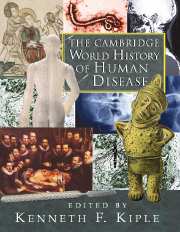Book contents
- Frontmatter
- Introduction
- Part I Medicine and Disease: An Overview
- Part II Changing Concepts of Health and Disease
- Part III Medical Specialties and Disease Prevention
- Part IV Measuring Health
- Part V The History of Human Disease in the World Outside Asia
- V.1 Diseases in the Pre-Roman World
- V.2 Diseases of Western Antiquity
- V.3 Diseases of the Middle Ages
- V.4 Diseases of the Renaissance and Early Modern Europe
- V.5 Diseases and the European Mortality Decline, 1700–1900
- V.6 Diseases of Sub-Saharan Africa to 1860
- V.7 Diseases of Sub-Saharan Africa since 1860
- V.8 Diseases of the Pre-Columbian Americas
- V.9 Diseases of the Americas, 1492-1700
- V.10 Diseases and Mortality in the Americas since 1700
- V.11 Diseases of the Islamic World
- Part VI The History of Human Disease in Asia
- Part VII The Geography of Human Disease
- Part VIII Major Human Diseases Past and Present
- Indexes
- References
V.2 - Diseases of Western Antiquity
from Part V - The History of Human Disease in the World Outside Asia
Published online by Cambridge University Press: 28 March 2008
- Frontmatter
- Introduction
- Part I Medicine and Disease: An Overview
- Part II Changing Concepts of Health and Disease
- Part III Medical Specialties and Disease Prevention
- Part IV Measuring Health
- Part V The History of Human Disease in the World Outside Asia
- V.1 Diseases in the Pre-Roman World
- V.2 Diseases of Western Antiquity
- V.3 Diseases of the Middle Ages
- V.4 Diseases of the Renaissance and Early Modern Europe
- V.5 Diseases and the European Mortality Decline, 1700–1900
- V.6 Diseases of Sub-Saharan Africa to 1860
- V.7 Diseases of Sub-Saharan Africa since 1860
- V.8 Diseases of the Pre-Columbian Americas
- V.9 Diseases of the Americas, 1492-1700
- V.10 Diseases and Mortality in the Americas since 1700
- V.11 Diseases of the Islamic World
- Part VI The History of Human Disease in Asia
- Part VII The Geography of Human Disease
- Part VIII Major Human Diseases Past and Present
- Indexes
- References
Summary
There are good reasons for believing that diseases and complaints of various kinds and degrees of severity were as much a part of everyday life in classical antiquity as were the assorted battle wounds and injuries so dramatically portrayed from Homer onward. This is indicated not only by the surviving Greek and Latin medical texts and the fragments preserved in Greco-Egyptian papyri, but also by the large corpus of nonmedical Greek and Latin texts, some of which are still being read today. In poetry, tragedy, and comedy, in history and annals, in philosophy and theology, as well as in botanical, agricultural, and pharmacological texts, illness and health and life and death constitute distinctive motifs.
To be certain, the evidence, both written and nonwritten, has survived in different states of preservation. It permits us, nonetheless, to reconstruct in part the intellectual and technological achievements of our past. Large gaps, however, exist in our knowledge of that past, and the absence of crucial details has led to hypotheses and inferences that cannot be tested directly.
Our knowledge of the diseases of classical antiquity stands somewhere between demonstrative certainty and complete ignorance. There is, after all, a sizable body of Greek and Latin medical texts, and it, in turn, has generated an even larger body of secondary literature. But for all that, our knowledge of the diseases of classical antiquity is far from complete. There are several reasons for its incompleteness, but it is important to keep in mind the enormous differences between the conceptual bases of the modern medical sciences and those of antiquity.
- Type
- Chapter
- Information
- The Cambridge World History of Human Disease , pp. 262 - 270Publisher: Cambridge University PressPrint publication year: 1993
References
- 2
- Cited by



